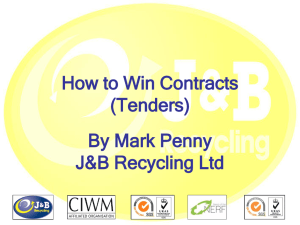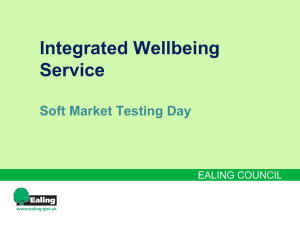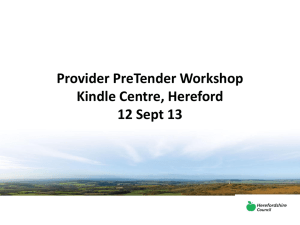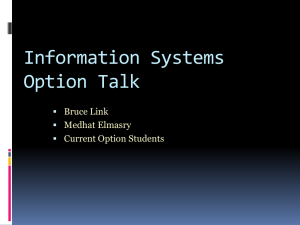James Burt
advertisement
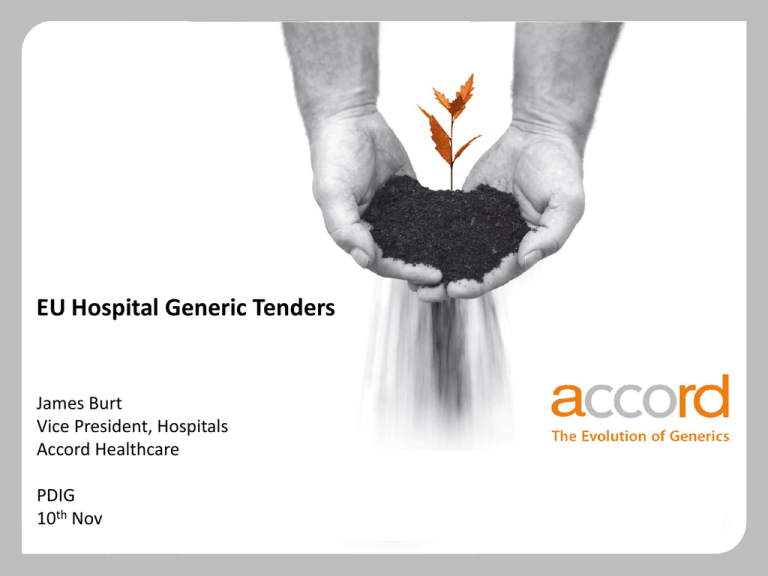
EU Hospital Generic Tenders James Burt Vice President, Hospitals Accord Healthcare PDIG 10th Nov Hospital Medicines Hospital acquired drugs account for approximately 2025% of global drug spend* Typically dominated by injectable and high potency forms Retail Channel Products are typically small volume, high unit value items Hospital Channel Often purchased via tender processes orchestrated by professional buyers Often additional safety or usage considerations exist Injectable *IMS, all available countries, 2009 sales value Oral Other Hospital Therapeutic Classes Generics represent approximately only 8-12% of the cost of hospital medicines* However, IMS tends to over estimate generic prices Generic The hospital generics value pool is dominated by oncology and systemic anti-infectives** UK hospital market 2009 IMS = €5.27B Generic ~ 15% UK tends to have lower brand prices and IMS tends to over estimate generic prices *IMS Value, Q4 08 Euro/MNF - 17 EU Hospital Markets, **UK data IMS 2009 Branded Unclassified Hospital Markets few annual/bi-annual tenders, compliant/inflexible, transparent, efficient distribution Nordics, UK, Netherlands, many tenders (>150), reasonable compliance, transparency poor, influencers unclear, pricing/ reimbursement complex, changing rules France, Italy, Poland hybrid regional tenders, hospital contracts and ‘spot’ business Spain, Austria, Ireland, Portugal No tenders, physician influence high (DE private sector/BE total), range important as bundling common Germany, Belgium, Switzerland Tender Longevity: Supply periods vary by country from 2 weeks 4 years most common 12 months, calendar year cycle typical: i.e. summer submission autumn adjudication winter start Short tenders: emergency tenders in UK/Netherlands/ Denmark, cover patent expiry until regular cycle Retail tenders in Nordics, 3mths 2 weeks Implications: Supply chain difficulty (OOS common), user/patient confusion, increased work load for adjudicators (suit commodity products), lower price pressure Long tenders: Spain: typically 3 years, UK/Netherlands: often 2 years, France: military 4 years Implications: helpful to supply chain, higher price pressure, difficult to estimate future COG movement Notice period: Notice period varies from 1 day 6 months (i.e. adjudication to 1st supply) most common 1-2 months, Manufacturing lead times can be up to 6 months (API order delivery of final released product) Long: Short: France/Portugal: just assume stock available Denmark: Oncology tender, notification in October 2011, first supply April 2012 Sweden: Halland tender 2 weeks notice given in 2011 Netherlands: IZDN notice October, first supply February Implications: Implications: If tender is large, can be very difficult to pre-empt without large risk of write offs For major tenders essential to give sufficient time for supply chains to respond Working capital considerations Losing company gets enough time to utilise stock on hand Stocking from previous session Number and Frequency 13 8 1/21 1 5/8 13+ 0+ 150+ 150+ 450+ 1000+ Low number of tenders: Denmark: single national tender (Kiwi like). 2+ supplier also ‘awarded’ No alternative product available if outage High number of tenders Poland: up to 200 per month High workload Other systems: Portugal: listing, not award Multiple awards, lack of clarity on demand Non price criteria: Many tenders now require additional information as part of the assessment In some markets these are weighted to build a final value (not cost) based assessment Contamination Denmark: 25% of assessment weight Presentation Range UK: common to exclude if not all available Sweden: reduced range = reduced score Stability data UK/Italy/Austria/Germany/Ireland: require some additional post reconstitution/ dilution data Denmark: Amgros initiated a consultation in Oct. Sweden: in scoring Supply performance UK/Sweden can be an exclusion criteria Formulation UK/Portugal/Netherlands: dual/triple awards Sweden: reduced score for powder vs solution Environmental Sweden: exclusion assessments made on environmental impact statements/reduction programs Romania: recently required demonstration of ISO140001/18001 program Artwork Denmark: Safe artwork design now makes up 15% of the assessment UK: can be an exclusion criteria NB: Prices in SKR Stockholm tender MODIFICATION PHARMACEUTICAL ADEQUACY COMPANY NAME MAX COMP 1 COMP 2 COMP 3 COMP 4 COMP 5 FULFILS ALL TENDER DEMANDS YES YES YES YES YES TOTAL PRICE OFFER 785,984 1,142,674 1,198,200 1,399,000 1,016,269 PRACTICAL HANDLING 20 15 15 10 10 15 MIX-UP RISK 15 15 15 15 6 15 CONTAMINATION RISK 10 8 10 8 8 8 INFORMATION 5 0 4 3 3 4 ENVIRONMENTAL 5 TOTAL 5 43 0 44 5 41 5 32 5 47 % NOT ACHIEVED 11.4% 10.5% 13.3% 21.9% 7.6% 22.8% 21% 26.6% 43.8% 15.2% NEW PRICE 965,637 1,382,091 1,517,720 2,011,895 1,171,129 RANKING 1 3 4 5 2 WEIGHT FACTOR 2x NB: Prices in SKR PRACTICAL HANDLING MIX-UP RISK Skåne Tender COMPANY NAME Fludarabine, Vincristine, Vinorelbine, Doxorubicin Cisplatin Methotrexate, Cytarabine, 5FU, Paclitaxel, Epirubicin, Carboplatin, Topotecan Gemcitabine, lipodoxorubicin, oxaliplatin, Irinotecan Stability Data 3,000 4,800 12,500 Compatability Data 3,000 4,880 12,500 Range 3,000 4,880 12,500 Special Equipment 3,000 4,880 12,500 Inspection 3,000 4,880 12,500 Missing Bar code OR VNR 3,500 8,000 25,000 Missing Barcode AND VNR 7,500 16,500 49,500 Clear readable label 7,500 16,500 49,500 Sheathing 4,500 7,300 30,000 Powder vs Solution 4,500 7,300 30,000 Security information 2,000 5,400 15,000 Extravasation information 2,000 5,400 15,000 Emetogenicity information 2,000 5,400 15,000 Patient information 2,000 5,400 15,000 Environmental information 2,000 5,400 15,000 PVC present 1,000 11,000 21,000 TOTAL 50,000 110,000 330,000 CONTAMINATION RISK INFORMATION ENVIRONMENTAL French example COMPANY NAME COMP 1 COMP 2 COMP 3 COMP 4 COMP 5 COMP 6 COMP 7 COMP 8 PRESENTATION 1 €10.00 €8.80 €10.90 €13.00 €9.00 €12.00 €12.00 €13.40 PRESENTATION 2 €32.00 €44.00 €39.90 €40.00 €30.00 €38.00 €60.00 €45.00 PRICE RANKING: 45% OF TOTAL 2 5 4 6 1 3 8 7 PHARMACEUTICAL BROCHURE VERY GOOD GOOD STABILITY DATA, OFFICIALLY ACCEPTABLE 24H OFFICIAL 28 D UNOFFICIAL 35 D OFFICIALLY PACKAGING VERY GOOD GOOD VIAL AND FLIP OFF TOP VERY BAD EXCELLENT STRENGTH AND FORMS VERY GOOD 35 D OFFICIAL EXCELLENT GOOD POOR TECHNICAL RANKING: 55% OF TOTAL 5 CALCULATED SCORE FINAL RANKING EXCELLENT SOLUTION SOON +2G PORTFOLIO EXCELLENT GOOD MEDIUM 2 5 3 8 6 1 4 3.65 3.35 4.55 4.35 4.85 4.65 4.15 5.35 2 1 5 4 7 6 3 8 NB: French Army Tender: not all French tenders the same POOR Other tender features: There are a broad range of other tender features that procurement systems set differently Often the unintended consequences are not understood Minimum Shelf life: Bar codes Ukraine: require 80% of shelf life remaining Sweden: required soon but scored now on vial. Denmark: required from 2012 Malta: 5/6ths shelf life remaining France/Serbia/Turkey/Italy/Belgium : Mass serialisation required on carton France: >3months remaining is OK Samples: Spain/Malta: require local finished stock UK: flexible, will take other country stock, or nude vials + artwork Payment terms Italy: average >6months, Spain: regional but worst region >600days! Germany: <30 days Supply times West EU: mostly individual hospital orders on a monthly cycle Bulgaria/Cyprus/Lithuania/Malta: often supply is in quarterly or half year drops CSR UK: green supply chain initiatives Ideal system UK Report card Medium length Regional, not national or individual hospital Multiple suppliers, not monopoly award Consistent volumes i.e. not price listing Samples from other countries or electronic versions acceptable Notice period in keeping with lead times Consistent and transparent weighting on nonprice attributes Reasonable payment terms Set shelf life remaining not % remaining Cautionary tale Procurement predominantly through group purchase organisations (GPOs) Bundling often evident with loss leading on some common products Product often unique to market Stock dumping common shortly after multi-market supply starts Limited number of ‘deep pocket’ players remain High volume + limited number of remaining players = high likelihood of shortages Thank you!


